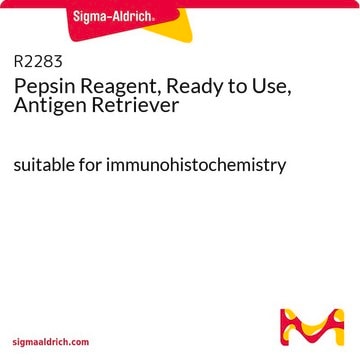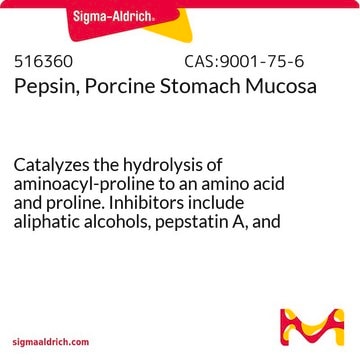10108057001
Roche
Pepsin
lyophilized (salt-free), ~2500 units/mg protein (At 37 °C with hemoglobin as the substrate. One unit is the enzyme activity which liberates the amount of Tyr producing an increase in the absorbance of 0.001/minute at 280 nm.)
Synonyma:
pepsin
Přihlásitk zobrazení cen stanovených pro organizaci a smluvních cen
About This Item
Doporučené produkty
biological source
pig gastric mucosa
Quality Level
form
lyophilized (salt-free)
specific activity
~2500 units/mg protein
packaging
pkg of 1 g
manufacturer/tradename
Roche
optimum pH
1.8-2.2
shipped in
wet ice
storage temp.
2-8°C
General description
Pepsin is an aspartic endoproteinase isolated from pig gastric mucosa. It is mainly used for the unspecific hydrolysis of proteins and peptides in acidic media. It also provides a limited hydrolysis of native immunoglobulins to yield biologically active fragments.
Specificity
Aspartic endopeptidase with relatively broad specificity. Preferential cleavage: hydrophobic, preferably aromatic, residues in P1 and P1′ positions.
Application
Pepsin has been used for the digestion of liver tissue obtained from rat.
Preparation Note
Working concentration: 0.05 to 0.5 mg/ml
Storage conditions (working solution): A pepsin solution is stable at 2 to 8 °C, at least for one week, at neutral pH and under germfree conditions. Frozen aliquots of the enzyme solution are expected to be more stable.
A stock solution in 10 mM HCl (5-10 mg/ml) should be stable for at least one week at 2 to 8 °C, too. Storage light protected, tightly closed.
A short (2 minutes) incubation at 40 °C has negligible effect on the activity of lyophilized pepsin or pepsin in solution.
Storage conditions (working solution): A pepsin solution is stable at 2 to 8 °C, at least for one week, at neutral pH and under germfree conditions. Frozen aliquots of the enzyme solution are expected to be more stable.
A stock solution in 10 mM HCl (5-10 mg/ml) should be stable for at least one week at 2 to 8 °C, too. Storage light protected, tightly closed.
A short (2 minutes) incubation at 40 °C has negligible effect on the activity of lyophilized pepsin or pepsin in solution.
Analysis Note
At 37 °C with hemoglobin as the substrate. One unit is the enzyme activity which liberates the amount of Tyr producing an increase in the absorbance of 0.001/minute at 280 nm.
Other Notes
For life science research only. Not for use in diagnostic procedures.
signalword
Danger
hcodes
Hazard Classifications
Eye Irrit. 2 - Resp. Sens. 1 - Skin Irrit. 2 - STOT SE 3
target_organs
Respiratory system
Storage Class
11 - Combustible Solids
wgk_germany
WGK 1
flash_point_f
Not applicable
flash_point_c
Not applicable
Osvědčení o analýze (COA)
Vyhledejte osvědčení Osvědčení o analýze (COA) zadáním čísla šarže/dávky těchto produktů. Čísla šarže a dávky lze nalézt na štítku produktu za slovy „Lot“ nebo „Batch“.
Již tento produkt vlastníte?
Dokumenty související s produkty, které jste v minulosti zakoupili, byly za účelem usnadnění shromážděny ve vaší Knihovně dokumentů.
Zákazníci si také prohlíželi
Lauren M Ashwood et al.
BMC biology, 21(1), 121-121 (2023-05-25)
The ShK toxin from Stichodactyla helianthus has established the therapeutic potential of sea anemone venom peptides, but many lineage-specific toxin families in Actiniarians remain uncharacterised. One such peptide family, sea anemone 8 (SA8), is present in all five sea anemone superfamilies.
Marie van Dijk et al.
Prenatal diagnosis, 42(13), 1612-1621 (2022-11-08)
Noninvasive Prenatal Diagnosis has recently been introduced for a limited number of monogenetic disorders. However, the majority of DNA diagnostics still require fetal material obtained using an invasive test. Recently, a novel technique, TRIC (Trophoblast Retrieval and Isolation from the
William D Kim et al.
Frontiers in genetics, 13, 1045738-1045738 (2022-11-29)
Mutations in CLN5 cause a subtype of neuronal ceroid lipofuscinosis (NCL) called CLN5 disease. The NCLs, commonly referred to as Batten disease, are a family of neurodegenerative lysosomal storage diseases that affect all ages and ethnicities globally. Previous research showed
Ganesan Arunkumar et al.
Science advances, 8(9), eabl5621-eabl5621 (2022-03-03)
Chromosome instability is a critical event in cancer progression. Histone H3 variant CENP-A plays a fundamental role in defining centromere identity, structure, and function but is innately overexpressed in several types of solid cancers. In the cancer background, excess CENP-A
Claus Kordes et al.
The Journal of clinical investigation, 124(12), 5503-5515 (2014-11-18)
Retinoid-storing hepatic stellate cells (HSCs) have recently been described as a liver-resident mesenchymal stem cell (MSC) population; however, it is not clear whether these cells contribute to liver regeneration or serve as a progenitor cell population with hepatobiliary characteristics. Here
Náš tým vědeckých pracovníků má zkušenosti ve všech oblastech výzkumu, včetně přírodních věd, materiálových věd, chemické syntézy, chromatografie, analytiky a mnoha dalších..
Obraťte se na technický servis.










